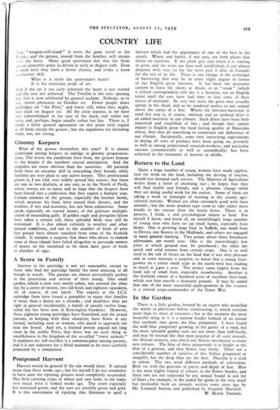Postponed Harvest
Harvest would be general if the sun would shine. It optned more than three weeks ago ; but for myself I do not remember to have seen the ripening process more completely suspended. One field carrying crops of wheat and oats looks to me today very much what it looked weeks ago. The straw especially has remained green, and the ears are patchily green and gold. It is this unevenness of ripening that threatens to spoil a harvest which had the appearance of one of the best in the annals. Wheat and barley, if not oats, are both plants that thrive on sunshine. If the plant gets rain when it is starting to grow, and the roots are then well established, it can almost dispense with rain (as for the most part it does in Canada) for the rest of its life. There is one change in the technique of harvesting that may be in some slight degree in favour of our English grain harvests. It has been the necessary custom to leave the sheafs in shock, or in " stook " (which a critical correspondent tells me is a Scottish, not an English term) until the ears have had time to lose some of their excess of moisture. In very wet years the grain may actually sprout in the sheaf, and so be rendered useless to any animal above the status of a hen. Where the thresher-harvester is used this step is, of course, omitted, and an artificial drier is an added necessity in our climate. Such driers have been both improved and simplified of late ; and though they cannot impart to English grain the hard lasting quality of Manitoba wheat, they may do something to counteract one deficiency of our climate. Incidentally, some very interesting experiments in drying all sorts of produce have been going on, privately as well as among professional research-workers; and particular success (commercially as well as scientifically) has been achieved in the treatment of lucerne or alfalfa.








































 Previous page
Previous page